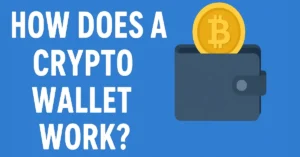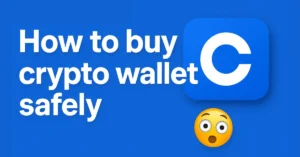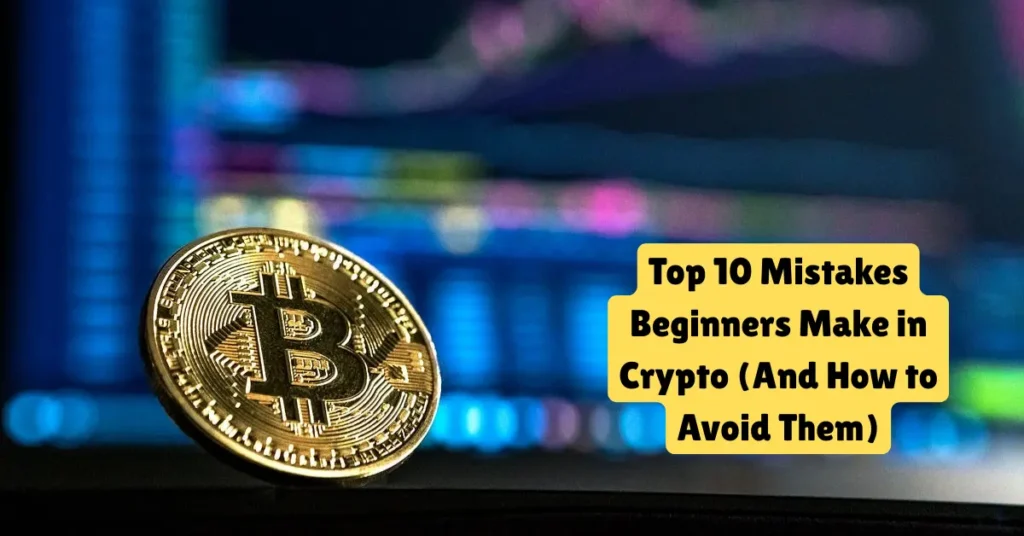Top 10 Mistakes Beginners Make in Crypto
Introduction
Cryptocurrency has become one of the most exciting topics in the world of finance and technology. From Bitcoin to Ethereum and thousands of other coins, people everywhere are talking about crypto and its potential to bring big returns. It’s no surprise that more and more beginners are jumping into the crypto space, hoping to make smart investments.
But here’s the truth: while crypto can offer great opportunities, it can also be risky, especially if you’re just starting and don’t know what to watch out for. Many beginners make common mistakes that can cost them money, time, or even their entire investment.
In this blog post, we’ll go through the top mistakes beginners make in crypto—and most importantly, how you can avoid them. Whether you’re thinking of buying your first coin or already exploring crypto trading, this guide will help you make smarter, safer decisions on your journey.
Let’s get started!
1. Jumping In Without Research
One of the biggest mistakes beginners make in crypto is diving in without doing any research. Many people hear about a coin that’s “going to the moon” or see others making quick profits, and they rush to invest—without even understanding what they’re buying.
The truth is, cryptocurrency is more than just a trending topic. It’s a complex technology based on blockchain, and every coin or token serves a different purpose. Some projects are strong with real-world use cases, while others are just hype with no real value behind them.
Why it’s a problem:
When you invest blindly, you’re gambling. You might get lucky, but more often, you could end up buying into something that crashes or turns out to be a scam.
How to avoid this mistake:
- Take time to learn the basics of blockchain and how crypto works.
- Research the project behind any coin—look at their website, team, roadmap, and whitepaper.
- Understand what problem the project is solving and whether it has real demand.
- Follow trusted news sources, blogs, and crypto communities to stay informed.
Remember: In crypto, knowledge is power. The more you learn, the better your chances of making smart and safe investment decisions.
2. Trusting the Wrong Sources
In the crypto world, information spreads fast, especially on social media. Unfortunately, not all of it is reliable. Beginners often make the mistake of following the wrong people or trusting every tip they see online.
From Twitter influencers to YouTube channels and Telegram groups, there are many self-proclaimed “crypto experts” who give investment advice. Some promote coins because they’re paid to do so, not because the project has real value. Others may not even fully understand what they’re talking about.
Why it’s a problem:
If you rely on hype and bad advice, you could end up buying into weak or fake projects. This can lead to losses, frustration, and even a loss of trust in crypto altogether.
How to avoid this mistake:
- Don’t believe everything you see on social media, especially if it sounds too good to be true.
- Look for experienced voices who focus on education and provide facts, not hype.
- Always double-check news or recommendations from multiple reliable sources.
Follow official project announcements through their verified website or blog, not just random posts online.
Tip: Learn to do your research (commonly called “DYOR” in the crypto community). The more independent your decisions are, the better your chances of success.
3. Not Understanding Wallets and Private Keys
Another common mistake beginners make is misunderstanding how crypto wallets and private keys work. Many people think that when they buy crypto, it just sits safely in their app or exchange account — but that’s not always the case.
There are two main types of wallets:
Custodial wallets (like those on exchanges) are where a third party holds your crypto.
Non-custodial wallets where you control the private keys and fully own your crypto.
Your private key is like a secret password that gives you access to your crypto. If someone gets it, they can steal your funds. If you lose it, there’s no “forgot password” option — your crypto could be gone forever.
Why it’s a problem:
Many beginners don’t back up their private keys or store them safely. Others leave all their funds on exchanges, which can get hacked or shut down.
How to avoid this mistake:
- Learn how wallets work before transferring funds.
- Use a trusted non-custodial wallet (like MetaMask, Trust Wallet, or a hardware wallet) for better security.
- Always write down and securely store your private keys or recovery phrase (preferably offline).
- Never share your private key or seed phrase with anyone — not even if they claim to be “tech support.”
Reminder: If you don’t control your private keys, you don’t truly own your crypto.
4. Keeping All Funds on Exchanges
A mistake many beginners make is leaving all their crypto on exchanges. While it might seem convenient to keep your coins where you bought them, it’s one of the riskiest things you can do.
Crypto exchanges are great for trading, but they are not meant to be long-term storage solutions. They are centralized platforms, which means your assets are in their control, not yours.
Why it’s a problem:
Exchanges can get hacked, freeze accounts, or shut down without warning. If that happens, you could lose access to your crypto permanently. History has already shown this with several major exchange failures.
How to avoid this mistake:
- Once you’ve bought crypto, transfer it to a secure wallet — especially if you’re holding it for the long term.
- Use a hardware wallet (cold storage) for maximum safety, or a trusted software wallet if you’re just starting.
- Keep only the amount you need for trading on an exchange. The rest should be in your wallet, where you control the private keys.
Rule of thumb:
“Not your keys, not your coins.” If the exchange goes down, so does your access to your funds.
5. Falling for Scams and Phishing
Scams are everywhere in the crypto world, and beginners are often the main targets. Scammers know that many new users don’t yet understand how crypto works, and they use that to trick people into giving away their money or private information.
Scams can appear in many forms:
- Fake giveaways (like “Send 1 BTC, get 2 BTC back”)
- Phishing websites that look like real ones
- Fake apps or wallet downloads
Impersonators pretending to be from support teams or popular influencers
Why it’s a problem:
Once a scammer gets access to your wallet or tricks you into sending funds, there’s no way to reverse it. Crypto transactions are permanent, and there’s no customer service to recover stolen money.
How to avoid this mistake:
- Never share your private keys or recovery phrase with anyone — ever.
- Always double-check the URL before logging into a crypto website.
- Only download wallets and apps from official websites or trusted app stores.
- Be skeptical of offers that sound too good to be true, because they usually are.
- Don’t click on links in random messages, emails, or social media comments.
Stay alert: In crypto, security is your responsibility. Scammers are smart, but you can be smarter by staying cautious and informed.
6. Ignoring Volatility and Risk Management
Cryptocurrency prices can rise and fall fast — sometimes within minutes. This extreme price movement, known as volatility, is a normal part of the crypto market. But many beginners don’t understand this and end up making emotional or risky decisions.
Some invest all their savings expecting quick profits, while others panic and sell during dips, locking in losses that could’ve been avoided.
Why it’s a problem:
Without proper risk management, you could lose a large portion of your investment in a short time. Crypto isn’t guaranteed profit — it’s a high-risk asset, and treating it like a shortcut to wealth often leads to disappointment.
How to avoid this mistake:
- Only invest what you can afford to lose. Never use rent, loan money, or emergency savings for crypto.
- Start small and build your confidence as you learn.
- Don’t chase big profits — focus on consistent learning and smart decisions.
- Use tools like stop-loss orders to limit your downside if a trade goes wrong.
- Diversify your investments instead of putting everything into one coin.
Keep in mind:
Volatility is part of the game — managing it wisely is what sets smart investors apart from the rest.
7. Overtrading and Emotional Investing
When beginners enter the crypto market, it’s easy to get caught up in the excitement. Watching prices move up and down can feel like a game, and some people start trading too often, thinking they can make quick money. This is known as overtrading.
At the same time, many beginners make decisions based on emotions, like panic selling during a dip or rushing to buy when a coin is pumping. This emotional investing often leads to poor timing and unnecessary losses.
Why it’s a problem:
Crypto markets are unpredictable. Trading without a plan or chasing every price move usually leads to mistakes. Emotional decisions often go against long-term goals.
How to avoid this mistake:
- Create a clear strategy before you invest — know when to buy, hold, or sell.
- Avoid checking prices every few minutes. It can lead to stress and impulsive actions.
- Use tools like take-profit and stop-loss orders to stick to your plan.
- Don’t trade just for the thrill — treat it as a serious investment, not a gamble.
- Practice patience. Some of the best returns in crypto come from holding good projects long-term.
Pro tip:
Control your emotions. In crypto, discipline is often more valuable than knowledge.
8. Lack of Understanding of Taxes and Regulations
Many beginners forget that crypto isn’t completely outside the law. While it might seem like a new and unregulated space, most countries are now creating rules around how cryptocurrencies are taxed and traded. Ignoring these rules can lead to legal trouble or surprise tax bills later on.
Some people don’t realize that selling crypto for profit, swapping coins, or even using it to buy things can all be taxable events in many countries. Others may use unregistered platforms without knowing they’re breaking local laws.
Why it’s a problem:
If you don’t understand your tax responsibilities, you could end up paying penalties or facing audits. And using unregulated exchanges can put your funds at risk or get you into legal issues.
How to avoid this mistake:
- Learn how crypto is taxed in your country — check with local tax authorities or a financial advisor.
- Keep records of all your trades and transactions, even small ones.
- Use tools or apps that help track your portfolio and generate tax reports.
- Only use exchanges and platforms that are legal and registered in your region.
Remember:
Crypto might be decentralized, but your actions still have real-world consequences. Staying legal and informed will protect both your money and your peace of mind.
9. Chasing Pump-and-Dump Schemes
One of the biggest traps beginners fall into is chasing pump-and-dump schemes. These happen when a group of people artificially inflate the price of a coin by buying it all at once (“pump”), creating excitement and hype. Then, they quickly sell off their coins at the higher price (“dump”), causing the price to crash and leaving late buyers with big losses.
These schemes often happen with little-known or new coins and are promoted through social media or private groups.
Why it’s a problem:
If you get involved, you’ll likely buy at the peak and lose money when the price crashes. It’s not a sustainable or safe way to invest.
How to avoid this mistake:
- Be cautious of coins that suddenly spike in price without a clear reason.
- Avoid investing based solely on hype or tips from unknown sources.
- Focus on coins with strong fundamentals, good teams, and real-world use cases.
- Don’t rush into buying because of FOMO (fear of missing out).
Key advice:
Successful crypto investing takes patience and research, not chasing quick, risky profits.
10. Not Staying Updated
The world of cryptocurrency changes fast. New technologies, regulations, and projects appear every day. If you don’t keep yourself informed, you might miss important updates that can affect your investments or even your security.
Beginners often make the mistake of learning a little at the start and then forgetting to stay updated. This can lead to outdated knowledge and poor decisions.
Why it’s a problem:
Without current information, you might hold onto bad investments, fall for new scams, or miss out on opportunities to protect or grow your crypto.
How to avoid this mistake:
- Follow trusted crypto news websites and blogs.
- Join online communities and forums where experts discuss updates.
- Subscribe to newsletters from reputable sources.
- Stay aware of regulatory changes in your country.
- Make learning a continuous habit, not a one-time thing.
Remember:
In crypto, staying informed is part of staying safe and successful.
Common FAQs About Crypto Mistakes for Beginners
Do I need to know a lot about technology to invest in crypto?
No, you don’t have to be a tech expert. But it helps to understand basic concepts like what a blockchain is and how wallets work. Taking time to learn will protect your money and help you make better choices.
Can I trust all crypto advice on social media?
No, not all advice on social media is reliable. Many influencers promote coins because they are paid or misinformed. Always check multiple trusted sources and do your research before investing.
What happens if I lose my private key?
If you lose your private key or recovery phrase, you lose access to your crypto, and there’s no way to get it back. That’s why it’s very important to store your private keys safely offline.
Is it safe to keep my crypto on exchanges?
Keeping crypto on exchanges is convenient but risky. Exchanges can get hacked or freeze your account. It’s safer to move your coins to a personal wallet if you’re holding them for a long time.
How can I avoid scams in crypto?
Be very careful with giveaways, unknown websites, and anyone asking for your private key. Always use official sites and double-check URLs. If an offer sounds too good to be true, it probably is.
How much money should I invest in crypto?
Only invest what you can afford to lose. Crypto is risky, and prices can be very volatile. Start small and never use money needed for essentials like rent or bills.
Do I need to pay taxes on my crypto profits?
In many countries, yes. Crypto gains are often taxable. It’s important to keep records of your transactions and understand your local tax laws. Consulting a tax professional can help.
What is a pump-and-dump scheme?
It’s when a group of people artificially raise the price of a coin to attract buyers, then quickly sell off their coins, causing the price to crash. Avoid coins that suddenly jump in price without a clear reason.
How often should I check crypto news?
Try to check trusted news sources regularly, but don’t obsess over every price change. Staying informed helps you make better decisions and avoid scams or sudden risks.
Can I make quick money in crypto?
While some people have made fast profits, crypto is very risky and unpredictable. Thinking long-term and investing carefully rather than chasing quick wins is better.
Conclusion
Starting in crypto can be exciting, but it’s important to avoid the common mistakes many beginners make. By doing your research, staying safe, managing risks, and learning continuously, you can protect your money and make smarter choices. Remember, success in crypto takes patience and careful planning, not rushing or chasing quick profits. Stay informed, stay cautious, and enjoy your crypto journey!
Also read
- What is a Crypto Wallet and How Does It Work? – Coinsify
- 10 Crypto Terms Every Beginner Must Know – Coinsify
- What is Blockchain Technology – Complete Guide – Coinsify
- How to Buy Crypto Safely in 2025 – Complete Guide – Coinsify
- Bitcoin vs Ethereum: Key Differences Explained – Complete Guide
- Ultimate Blockchain Glossary: Learn Blockchain Terms Easily
- How to Buy Bitcoin Safely (Complete Beginner’s Guide)
- Top 10 Crypto Wallets for Beginners (2025 Edition)
- What is Cryptocurrency? A Beginner-Friendly Guide (2025)






